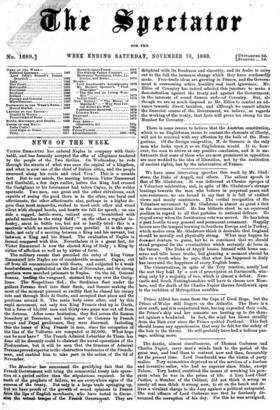We have some interesting speeches this week by Mr. Glad-
stone, the Duke of Argyll, and others. The salient speech is that of Mr. Gladstone. It was delivered at Chester apropos of a Volunteer celebration, and, in spite of Mr. Gladstone's strange leanings towards tho men who believe in perpetual peace and non-resistance, we are bound to say that it is full of exalted views and manly sentiments. The cordial recognition of the Volunteer movement by Mr. Gladstone is almost as great a fact as the movement itself. He has hitherto stood in an equivocal position in regard to all that pertains to national defence. He stayed away when the fortification vote was moved. He has taken a part hostile to any general and permanent armament. Happily_ he now sees the tempest brewing in Southern Europe and in Turkey, which makes even Mr. Gladstone think it desirable that England should be morally and physically strong. What may happen he does-not venture to guess, but he is convinced that we should stand prepared for the eventualities which certainly do loom in the future. The Duke of Argyll busies himself with home con- cerns and tells home truths, but glancing a moment abroad he tells us a truth when he says, that what has happened in Italy has increased the happiness of every English home. The Conservatives, in spite of the Tory reaction, nearly lost the seat they hold by a sort of prescription at Dartmouth, win- ning only by a majority of two, which is almost a defeat. New- castle and South Nottinghamshire will have to choose new Mem- bers, and the death of Sir Charles Napier throws Southwark open to the ambition of Metropolitan notables.


























